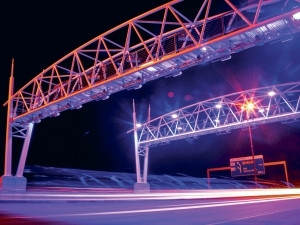
A rejection by eight of the country's nine provinces of the proposal to use the national fuel levy as a funding mechanism for e-tolling in Gauteng has been criticised by opponents of the system.
Provincial transport MECs reportedly rejected the idea unanimously at a recent meeting with transport minister Dipuo Peters, saying their provinces could not be expected to fund Gauteng's roads infrastructure.
E-tolling is under review by a panel appointed by Gauteng premier David Makhura, with the view of determining the socio-economic impact of the system on the province and its citizens. The majority of interested parties - including business, civic organisations and labour unions - have called for the user-pay principle to be scrapped, in favour of funding via the national fuel levy.
While the review panel has not yet completed its study, government has already stated it would not reconsider the system, creating outrage from e-tolling opponents. The latest rejection of the fuel levy option by provincial MECs has escalated the war of words.
'Selfish and short-sighted'
Opposition to Urban Tolling Alliance (Outa) chairperson Wayne Duvenage calls the stance "shocking and out of line", adding the objection to finance the Gauteng Freeway Improvement Project (GFIP) though general taxation, or the fuel levy, is "selfish and short-sighted".
"Firstly, I wonder what these provinces would say if the Gauteng province submitted an objection/motion to treasury, on the fact that Gauteng's tax receipts are being used to fund their provincial roads and other social infrastructure projects, and that perhaps a small portion of the revenues generated by this province should be held back to finance the GFIP upgrade," says Duvenage.
"Secondly, it's a matter they must be cautious to condemn, as they will no doubt disagree to allow e-tolls to be implemented in their provinces. In fact, it is disingenuous of them to denounce the fuel levy to fund Gauteng's roads, when both Cape Town and Durban have made very clear that e-tolls are not welcome in their regions."
Duvenage points out the South African National Roads Agency (Sanral) has indicated e-tolls will not be implemented in other major cities, "probably in the knowledge that it would never survive a proper public consultation process in those regions". He adds: "It's absurd that these provinces, who rely on the funds from Gauteng, adopt this attitude of holding out the begging bowl for finances, while spitting on the shoes of its benefactor."
'Not palatable'
Justice Project SA chairperson Howard Dembovsky was equally scathing in his response. "When it comes to a provincial levy as opposed to a national one, it is glaringly obvious that each province would need a different levy in accordance with its needs.
"We have to be honest upfront and say the concept of a provincial levy is not palatable, given the fact that South Africa is a single constitutional democracy, not a federation of independent states, and the concept of continuing to promote the separation of provinces is somewhat distasteful."
Dembovsky notes the term fuel levy can be defined as a "tax". "The question could arise that if one is going to have a different rate of taxation applicable for roads infrastructure in each province, then why is the same not true with respect to other taxation, like income tax, VAT, etc?
"This opens up a whole can of worms that should rather be left shut, considering there is a huge income disparity that runs through different provinces and it could be argued that poorer communities should pay a lower rate of VAT than the richer ones, income tax collected in Gauteng should not be used to pay social grants in the Eastern Cape, etc."
Dembovsky argues that if all of the money collected through the fuel levy was to go to a single entity, such as Sanral, it would be much easier to monitor how and where it was being spent. But, he says, this is not the case and, therefore, a provincial levy seems unmanageable. "We, therefore, cannot recommend that a provincial roads levy be considered."
Share